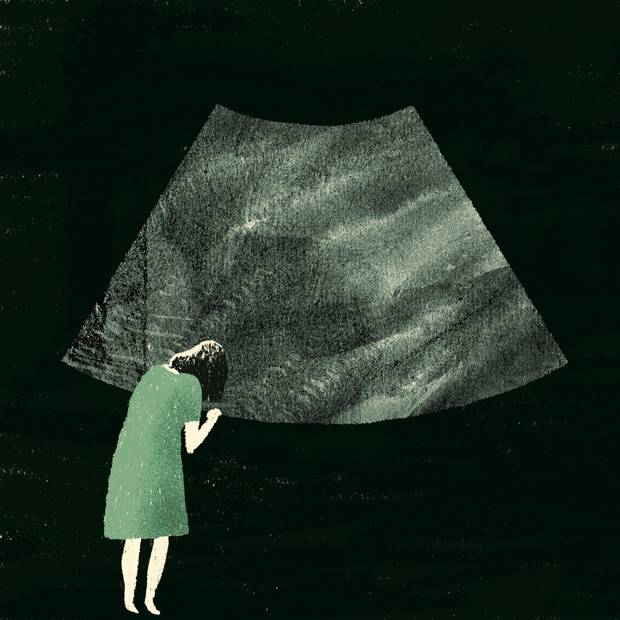Facts & Arguments is a daily personal piece submitted by readers. Have a story to tell? See our guidelines at tgam.ca/essayguide.
I woke up that morning with one thing in mind: checking my pregnancy app to see what fruit or vegetable the baby resembled that week. I was 11 weeks pregnant with my first child and couldn't have been more excited.
"It's the size of a lime!" I exclaimed to my husband over French toast (because, pregnancy diet). By now, our baby had fingers and toes, a distinct human face, even hair on the crown of its little head.
It was only four days until my 12-week ultrasound, when we would officially be "out of the woods" – free to tell the whole world. At that point, my biggest worry was how I would make the announcement on Facebook.
I started noticing some cramping late that morning, but brushed it off as another annoying pregnancy side effect. It wasn't until I wiped bright red blood that I became concerned. Still, I tried to remain calm; I had some spotting at five weeks and it had turned out to be nothing.
But that night, things took a turn for the worse. The bleeding and cramps intensified and, by morning, I knew something was wrong. My husband and I went to the hospital and in the waiting room, I began hemorrhaging badly. I willed my little lime to keep fighting.
They brought me into a makeshift hospital room, where a medical student asked me a series of questions. When did the bleeding start? Any back pain? Is this your first pregnancy? I resented the fact that he was chewing gum, like a bored telemarketer surveying me about my cellphone preferences. "I'll get the doctor and then we'll do an ultrasound," he said, "Sound good?"
No, it all sounds like a waking nightmare, thank you very much.
When the doctor arrived, the news was bleak. My hormone levels had dropped significantly and my ultrasound confirmed the inevitable.
Our baby, the one we had seen wriggling its little arms and legs at nine weeks, was gone.
"It's very common," the doctor said perfunctorily. "I'll give you a few minutes."
As soon as he left the room, I broke down. My sobs couldn't keep pace with the sadness washing over me. My husband held me and cried along with me.
Why had this happened?
Why to me?
I was so close to finishing the first trimester. So close!
The doctor recommended I let the miscarriage play out on its own and scheduled a follow-up the next morning.
"Oh and, uh, do you need any sanitary napkins?" he blundered, like a dad volunteering to go to the drug store for his teenage daughter.
"I'm fine," I shuddered.
On the way home, I bought a package of the largest, super absorbent pads I could find, and a basketful of candy. It struck me that I looked like a sad, one-dimensional female movie character who had just been dumped and got her period all in the same week.
I wished those were the worst of my problems.
The next morning, I went back to the hospital. It seemed like a cruel punishment, doing another ultrasound for a baby who wasn't there.
I thought back to the prior ultrasounds we had, and our excitement about seeing the baby grow. I was certain it was a boy; although my husband was sure it was a girl. We were going to share the news with our families over Christmas. We even had a few names picked out.
Instead, I stared at the dark nothingness on the screen.
The nurse said all the things I wanted to hear. That it was random. That it was nothing I did. That I was young and that, chances were, I would go on to have a healthy baby.
She was the first medical professional to show me compassion and I wanted to give her a hug, but instead, I awkwardly said, "I enjoyed talking to you."
She told me I might bleed for one to two weeks, but instead, I bled for seven. It felt like the longest period imaginable, complete with awful cramps and crazy hormonal swings that frequently ended in crying jags.
Slowly, very slowly, normal life resumed. I got off the couch. I went back to work. I kept going.
But even once I was back in my normal routine, the unhappy thoughts crept in. I would be grocery shopping or in the middle of a meeting and, suddenly, be paralyzed by a deep and profound sadness.
I wondered whether I was too emotional about it, but also, if I was emotional enough. I read online about women who made pieces of jewellery out of their baby's remains. Did not commemorating my baby with a necklace mean that I wasn't grieving enough?
And while my brain understood the hard, medical reality of it all, that miscarriages occur in up to 25 per cent of pregnancies and usually for genetic reasons, this didn't stop the irrational voice in my head from questioning "But what if it was you?" I hadn't always been religious about my prenatal vitamins. What if I was just broken and would never have a baby?
One of the hardest things about miscarriage is that you will never have all the answers, no matter how many questions you ask or Google rabbit holes you go down. You can't know what the future will hold, if you will go on to be happy, or if this misery will find you again.
While the thought of becoming pregnant again fills me with anxiety, I know I want to try. Because the truth is, I felt like I became a mother the moment that test read positive and like lighting a candle, it sparked a chemical change in me that can't be reversed.
Breann Kirincich lives in Toronto.
